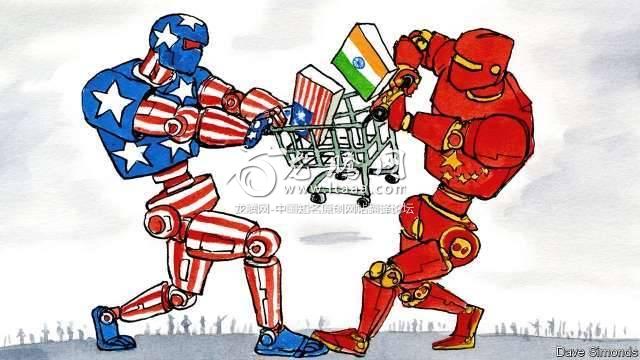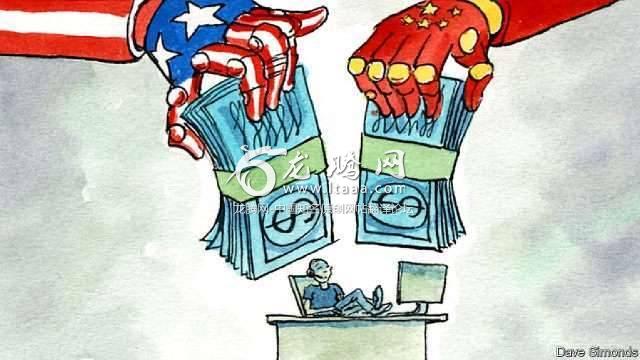诸神之战:中美科技巨头在新兴市场奋力拼搏 《经济学人》 [美国媒体]
两场竞赛正在进行中,拥有数十亿美元的巨头们正在争夺全球的统治地位,其中一个是在俄罗斯足球场上展开的,它的代表是内马尔和哈里·凯恩,另一个在印度、印度尼西亚、巴西以及其它新兴经济体的智能手机屏幕上展开,谷歌、Facebook和亚马逊等美国互联网超级巨星正与由阿里巴巴和腾讯领导的中国梦之队展开较量。
Clash of the titans Chinese and US tech giants go at it in emerging markets
诸神之战:中美科技巨头在新兴市场奋力拼搏 《经济学人》
2018年7月7日
Jul 7th 2018
TWO contests are under way in which titans holding billions in their thrall vie for global domination. One is unfolding on Russian football pitches and features the likes of Neymar and Harry Kane. The other is playing out on the smartphone screens of consumers in India, Indonesia, Brazil and other emerging economies. There, American online superstars such as Google, Facebook and Amazon are pitted against a Chinese dream team led by Alibaba and Tencent.
两场竞赛正在进行中,拥有数十亿美元的巨头们正在争夺全球的统治地位,其中一个是在俄罗斯足球场上展开的,它的代表是内马尔和哈里·凯恩,另一个在印度、印度尼西亚、巴西以及其它新兴经济体的智能手机屏幕上展开,谷歌、Facebook和亚马逊等美国互联网超级巨星正与由阿里巴巴和腾讯领导的中国梦之队展开较量。
The geopolitics of business means that the world’s biggest tech firms have swelled to combined market capitalisations of over $4trn without really going head to head. China blocked Google et al with its Great Firewall, preventing American firms (Apple is an obvious exception) from taking on Chinese rivals on the mainland. Chinese giants have stayed out of America; Europe fell under the spell of Silicon Valley before Chinese tech had matured.
商业化的地缘政治意味着,世界上最大的科技公司们已经膨胀到超过4万亿美元的合并市值,却没有真正进行正面交锋。中国用其防火墙阻止谷歌等美国公司 ( 苹果是一个明显的例外 ) 与中国大陆的竞争对手的竞争,中国的巨头们一直远离美国,而在中国科技成熟之前,欧洲就已经陷入了硅谷的魔咒之中。
Time, and capabilities, have changed. Chinese tech firms once simply mimicked Silicon Valley products, from search engines to e-commerce and social networks. Now the copycats have become pioneers. WeChat, for example, rivals anything from California.
时代和能力已经改变了,中国科技公司曾经只会模仿硅谷的产品,从搜索引擎到电子商务和社交网络均是如此, 而如今,这些模仿者已经成为了先驱,比如“微信”,一款由腾讯运营的即时通讯软件,完全可以与加利福尼亚的任何产品相媲美。
Mainland firms are thus ready to make a strong play for markets which neither they nor American firms can call home. Rising incomes, ballooning smartphone use and improving internet infrastructure in emerging markets make them irresistible terrain for all tech firms. As they vie for the next billion consumers to come online, Alibaba is taking on Amazon, Google is matched against Baidu and Tencent can prove its mettle against Facebook.
中国大陆公司已经准备好了在他们和美国公司都无法称之为“ 本土市场”的市场上进行强有力的竞争。收入的增长,智能手机使用量的不断增加,以及新兴市场互联网基础设施的不断改善,使得它们成为对所有科技公司都有着不可抗拒吸引力的市场。 随着他们开始争夺下一个10亿级网络消费市场,阿里巴巴正在与亚马逊展开竞争,而谷歌与百度针锋相对,腾讯完全证明了其可与 Facebook 一较高下的竞争力。
They have very different strategies, however. American firms typically set up outposts from scratch. They fund subsidiaries that offer much the same service to Indians or Mexicans as their domestic users might expect. Amazon’s foray into India, for example, involved it pledging over $5bn to broadly replicate its American offering. It has built a network of warehouses to fulfil e-commerce orders, rolled out its Prime video service (with added Bollywood content), website-hosting services and so on. It rebrands acquisitions. Last year it paid $650m for Souq.com, an e-commerce website based in Dubai, now clearly marked as “an Amazon company”.
然而,他们有着截然不同的策略,美国公司通常从零开始建立前哨,他们为子公司提供资金,这些子公司向印度或墨西哥人提供的服务与他们的国内用户可能期望的服务大致相同。例如,亚马逊进军印度,承诺提供超过50亿美元的资金,以广泛复制其在美国的产品,它已经建立了一个仓库网络来完成电子商务订单,推出了它的 Prime 视频服务( 增加了宝莱坞的内容),网站托管服务等等,它重塑了收购的品牌,去年,它斥资6.5亿美元收购了总部位于迪拜的电子商务网站Souq.com,该网站现在被明确标记为“一家亚马逊公司”。
Google and Facebook also provide offerings abroad similar to those that consumers get in America; as a result, both are as recognised in Brasilia or Bangalore as they would be in Boston or Berlin. Google customers worldwide use the same Chrome browser, YouTube website or Android phone-operating system—and are served advertisements in much the same way. WhatsApp and Instagram, both owned by Facebook, are popular across the world.
谷歌和Facebook在海外提供了类似于美国消费者的产品,因此,它们在巴西利亚或班加罗尔的知名度就像在波士顿或柏林一样,世界各地的谷歌客户使用同样的 Chrome 浏览器、YouTube网站 或 Android手机操作系统——并以同样的方式提供广告服务,WhatsApp 和 Instagram 都属Facebook的所有,在全世界都很受欢迎。
By contrast, few Indonesians or Indians would recognise the name Alibaba. Its strategy in emerging markets has been not to set up shop itself but instead to invest in local players, whether by buying them outright or taking a minority stake. In the past two years or so it has built a constellation of firms focused on shopping, payments and delivery. These include Paytm and BigBasket in India, Tokopedia in Indonesia, Lazada in Singapore, Daraz in Pakistan and, as of July 2nd, Trendyol in Turkey. Most of their customers would have no idea that these apps are backed by a Chinese tech titan.
相比之下,很少有印尼人或印度人会知道阿里巴巴这个名字,该公司在新兴市场的策略并不是自己创业,而是投资于本土企业,无论是直接收购它们,还是收购它们的少数股权,在过去两年左右的时间里,它建立了一批专注于购物、付款和物流的公司,其中包括印度的 Paytm 和 BigBasket,印度尼西亚的 Tokopedia,新加坡的 Lazada,巴基斯坦的 Daraz,以及土耳其的 Trendyol,他们的大多数客户都不知道这些应用是由一位中国科技巨头支持的。
Tencent has similarly ploughed money into a clutch of Indian firms in areas as diverse as ride-hailing, online education, music-streaming, health care, IT and e-commerce, as well as Nigerian payments and Indonesian logistics. (Baidu is the least active thus far in building its emerging-market presence, but its heavy investment in artificial intelligence could result in its technology being used globally in self-driving cars, for example.) According to CBInsights, a data firm, Tencent, Alibaba and its Ant Financial affiliate have backed 43% of all Asian “unicorns”, meaning startups worth more than $1bn. Alibaba’s investment in Lazada, South-East Asia’s largest e-commerce platform, has soaked up $4bn. Jack Ma, Alibaba’s founder and boss, has pledged $8bn to India alone.
腾讯也对众多印度公司进行了类似的投资,这些领域包括打车、在线教育、音乐流媒体、医疗保健、IT和电子商务,比如尼日利亚支付系统和印尼的物流系统。( 百度是迄今为止在建立其新兴市场影响力方面活跃程度最低的公司,但它在人工智能领域的大量投资可能会使其技术在全球范围内应用于无人驾驶汽车 )
根据数据公司 CBInsight 的数据,腾讯、阿里巴巴及其旗下的蚂蚁金服旗下的蚂蚁金服已经为43%的亚洲“独角兽”公司提供了支持,这意味着其初创企业价值超过10亿美元,阿里巴巴对东南亚最大的电子商务平台 Lazada 的投资已经投入了40亿美元,阿里巴巴创始人兼总裁马云仅对印度就承诺了提供80亿美元。
Their different approaches reflect the way the Western and Chinese firms make money. Google and Facebook earn the bulk of their revenue from advertising against services their users flock to. This requires little localisation, bar a bit of website translation to attract native users.
他们的不同做法反映了西方和中国企业不同的获利方式,谷歌和 Facebook 的大部分收入来自于针对用户群体的广告收入,这几乎不需要本地化,只需一点网站翻译就能吸引本地用户。
Chinese firms’ competitive advantage, by contrast, has historically come from being able to process payments and organise distribution of goods in a country where doing such things had previously been tricky. A business based on solving such nuts-and-bolts problems is hard to export. “For that sort of thing, it is difficult to have a one-size-fits-all approach for different countries,” says Tan Yinglan of Insignia Ventures Partners, a tech-investment firm. Being a distribution expert in Singapore (whose former postal monopoly is now 14% owned by Alibaba) brings little insight into distributing packages throughout Indonesia’s 17,500 islands, say. Nor does the ability to process payments in Vietnam smooth transactions in Brazil or in Nigeria, with their vastly different banking and regulatory systems. Such intricacies, in other words, might be better delivered by local entrepreneurs who can be bought out once they have cracked them.
相比之下,中国企业的竞争优势历来来自于其处理付款和组织货物分配、商品分销的能力,而往往在这个国家,做这样的事情在以前是很棘手的,以解决这些细节问题为基础的企业很难出口,科技投资公司 Insignia Ventures Partners 的Tan Ying lan表示:“ 就这种情况而言,不同国家很难采取一刀切的方法。”作为新加坡的一名分销专家( 阿里巴巴目前拥有新加坡14%的邮政垄断地位 ) ,对印尼17500个岛屿的包裹分发几乎没有什么洞察力,在越南处理付款的能力也不能使巴西或尼日利亚的交易顺利进行,因为这两个国家的银行和监管体系迥然不同,换句话说,这些错综复杂的东西最好由当地企业家完成,一旦他们攻破了难关,它们就可以被买断了。
How are these differing strategies panning out on the ground? The most intense Sino-American rivalry thus far is focused on India and South-East Asia. The scale of investment reflects the stakes: Indian start-ups received $5.2bn in Chinese tech money last year, according to Tracxn, a data provider, up from $930m in 2016. Forrester, a market-research group, says that Chinese tech giants (including Didi and JD.com) spent $6bn on acquisitions in South-East Asia in 2017.
这些不同的战略是如何实际发挥作用的?到目前为止,中美之间最激烈的竞争集中在印度和东南亚。
投资规模反映了这方面的利害关系:数据提供商 tracxn 的数据显示,印度初创企业去年获得了52亿美元的中国科技资金,高于2016年的9.3亿美元,市场研究集团 Forrester称,2017年,中国科技巨头( 包括滴滴和京东 ) 在东南亚的收购支出为60亿美元。
The Chinese firms have several advantages. They have a proven record of chaperoning hundreds of millions of emerging-market consumers onto the internet. A Chinese diaspora in places like Malaysia or Vietnam, paired with plenty of mainland tourists, offers a beachhead into those markets. The Chinese giants also enjoy the tacit support of their country’s government, which is keen for them to expand in “Belt and Road” countries near China. Startup founders in Asia are more likely to want to emulate Mr Ma than his American counterparts; they will certainly prefer the Chinese approach if they want to keep running their firms.
中国公司有几个优势,他们有着在互联网上陪伴数亿新兴市场消费者成长的良好记录。在马来西亚或越南等地散居的中国人,加上大量大陆游客,为进入这些市场提供了一个滩头阵地。中国的巨头们也得到了中国政府的默许,他们渴望在中国附近的“一带一路”相关国家扩张。与美国同行相比,亚洲的初创企业创始人更愿意效仿马云,如果他们想继续经营自己的公司,他们肯定会更喜欢中国的做法。
Yet to critics, the Chinese approach is akin to what corporate Japan did in the 1980s: overpay for trophy assets in a hopelessly undisciplined way. Chinese firms sometimes end up competing against themselves. Tokopedia and Lazada in Indonesia sell similar stuff and are both backed by Alibaba, for example. Its investment in Paytm came only after it had bet on Snapdeal, a former Indian e-commerce darling whose star has dimmed markedly.
然而,在批评人士看来,中国的做法类似于日本企业在上世纪80年代所做的那样:以一种无可救药的、毫无章法的方式收购巨额资产,中国企业有时甚至会与自己竞争,例如,印尼的 Tokopedia 和 Lazada 都销售类似的产品,而且都得到了阿里巴巴的支持,在投资 Paytm 之前,该公司曾押注于前印度电子商务宠儿 Snapdeal,该公司的星光已明显黯淡。
Valuations can be eye-popping. That is partly because there is a lot of capital about. Venture capitalists worried about losing their relevance in the region want to stay invested. SoftBank, a risk-loving Japanese group that is attracted to fashionable startups like a Brazilian to a football trophy, is among those who made a fortune in China (it is Alibaba’s biggest shareholder) and is keen to repeat the feat in other rising tech powers.
估值可能令人瞠目结舌,这在一定程度上是因为这里有大量的资本,风险投资家担心失去在该地区的影响力,希望继续投资,软银是一家酷爱风险的日本集团,被像巴西人被足球奖杯吸引一样,被流行的初创企业所吸引,它是在中国大发其财的公司之一 ( 它是阿里巴巴的最大股东 ),并热衷于在其他新兴科技国家重演这一壮举。
The Americans’ edge lies with their record and their head start. The Silicon Valley giants internationalised operations more or less from the start. Amazon’s British and German arms are about to celebrate their 20th anniversaries. It is easier for English-language firms than for Chinese ones to hire staff or to attract users. Over half of Google’s and Facebook’s revenues already come from outside America. Alibaba, the most internationalised Chinese firm, is barely at 10%, though it hopes half the value of the stuff sold through it will be transacted overseas by 2025.
美国人的优势在于他们的记录和他们的领先优势,硅谷巨头或多或少地从一开始就将业务国际化,亚马逊的英国和德国团队即将庆祝他们的20周年纪念日,对于英语公司来说,它们雇佣员工或吸引用户比中国公司更容易。
谷歌和 Facebook 超过一半的收入来自美国以外的地区,阿里巴巴是中国国际化程度最高的公司,目前的市场份额仅为10% ,不过该公司希望,到2025年,通过阿里巴巴销售的商品价值的一半将来自海外。
Global heft counts for something in local battles. Services such as Amazon’s movie-streaming offering can be rolled out from one country to the next, as can its relationships with global suppliers. That has made it cheaper to set up foreign outposts than to acquire them. Amazon has probably spent about $3.5bn to date building its Indian operation, where it is largely on a par in terms of market share with Flipkart, a local e-commerce site which has raised nearly double that in equity and debt.
在局部战争中,全球性的影响力是有价值的。 亚马逊的电影流媒体等服务可以从一个国家推广到下一个国家,它与全球供应商之间的关系也是如此,这使得建立外国前哨基地的成本低于收购它们的成本,迄今为止,亚马逊可能已投入约35亿美元以建设其印度业务,其市场份额在很大程度上与当地电子商务网站 Flipkart 的市场份额持平,Flipkart 是一家本土电子商务网站,在股票和债务方面的筹资额几乎是前者的两倍。
The downside of the American approach is that subsidiaries are wedded to a business model that proved itself in completely different circumstances. Like the Chinese, most Asian consumers use only mobile phones to access the internet; the American trio made their first fortunes through PCs. Some think the executives dispatched from head office lack the fizz of the local entrepreneurs they are taking on, and rely overly on lavish cheques from head office.
美国方式的不利之处在于,子公司所依赖的是一种需要在完全不同的情况下证明自己的商业模式。和中国人一样,大多数亚洲消费者只使用手机上网,而美国三巨头则是通过个人电脑获得了他们的第一笔财富,一些人认为,总部派来的高管缺乏他们所聘用的当地企业家的热情,他们过度依赖总部的巨额支票。
The two models could yet both be proved right, and start to converge. The advantages of being part of a global outfit might be decisive in delivering some services, such as search or social media. Alibaba is pushing its own branded B2B platform for Indian small businesses, helping them sell their wares abroad and, in this instance, expanding in much the same way that an American rival might have done. In other areas, where local nous matters more, American groups might adopt a more Chinese-style approach of building an “ecosystem” of allied firms. Amazon was said to be interested in buying Flipkart, in which Walmart is now buying a majority stake (in part from Tencent); Google is still said to be mulling a minority investment. On June 17th Google invested $550m in JD.com, a Chinese e-commerce firm which has spent lavishly on startups in Indonesia, Thailand and Vietnam.
这两种模式都可以证明是正确的,并开始趋同,成为全球服务的一部分的优势可能对提供一些服务( 如搜索或社交媒体)具有决定性作用。阿里巴巴正在为印度小企业推出自有品牌的B2B平台,帮助它们将产品销往海外,在这种情况下,其扩张的方式与美国竞争对手的扩张方式大同小异。在其他地方,当地的理性更重要,美国公司可能采取更中国式的方法,建立一个联盟企业的“生态系统”,据说亚马逊有兴趣收购 Flipkart,沃尔玛目前正在收购 Flipkart 的多数股权( 部分来自腾讯 ),据说谷歌也仍在考虑进行少数股权投资,6月17日,谷歌向中国电子商务公司京东投资5.5亿美元,这是一家在印度尼西亚、泰国和越南大量投资于初创企业的中国电子商务公司。
User numbers for services that are free of charge in emerging markets are inevitably mind-boggling—eight of the ten countries with the largest number of Facebook users are emerging markets, led by India with 270m. Whether that will translate into a commensurate level of revenue and profits is less clear. For all the excitement around Indian e-commerce, say, only about $27bn-worth of stuff is shifted online in India each year—about what all Chinese e-commerce firms sell in just nine days and American ones in three weeks. South-East Asia is smaller still.
新兴市场免费服务的用户数量不可避免地令人难以置信——Facebook用户数量最多的10个国家中,有8个是新兴市场,其中以2.7亿用户的印度为首,但这是否会转化为与之相称的收入和利润水平,目前尚不清楚。例如,尽管印度电子商务激起了许多人的兴奋情绪,但印度每年只有大约270亿美元的商品在网上流转——这与中国电子商务公司短短9天内的销售额和美国企业3周内的销售额大致相同,而东南亚则更小。
No matter, so far as the tech firms are concerned. Winning the next billion users is seen as an investment worth making at almost any cost. Chinese tech giants must reckon with a dwindling number of new recruits to the internet at home; they also have the confidence, clout and capabilities to expand abroad. America’s titans might once have expected to face meek local rivals in emerging markets; now they have a fight on their hands. It is one they could barely have imagined four years ago.
不管怎么说,就科技公司而言,赢得接下来的10亿用户被视为一项投资,几乎不惜任何代价。中国科技巨头必须考虑到国内互联网新用户数量的不断减少,他们也有信心、影响力和能力向海外扩张,而美国的巨头们可能曾经希望在新兴市场面对的是温顺的本土对手,现在他们已经开始战斗了,这是四年前是几乎无法想象的。
This article appeared in the Business section of the print edition under the headline "Clash of the titans"
本文发表在《经济学人》印刷版的商业版块,标题为《诸神之战》。
版权声明
我们致力于传递世界各地老百姓最真实、最直接、最详尽的对中国的看法
【版权与免责声明】如发现内容存在版权问题,烦请提供相关信息发邮件,
我们将及时沟通与处理。本站内容除非来源注明五毛网,否则均为网友转载,涉及言论、版权与本站无关。
本文仅代表作者观点,不代表本站立场。
本文来自网络,如有侵权及时联系本网站。
图文文章RECOMMEND
热门文章HOT NEWS
-
1
Why do most people who have a positive view of China have been to ...
- 2
- 3
- 4
- 5
- 6
- 7
- 8
- 9
- 10
推荐文章HOT NEWS
-
1
Why do most people who have a positive view of China have been to ...
- 2
- 3
- 4
- 5
- 6
- 7
- 8
- 9
- 10













